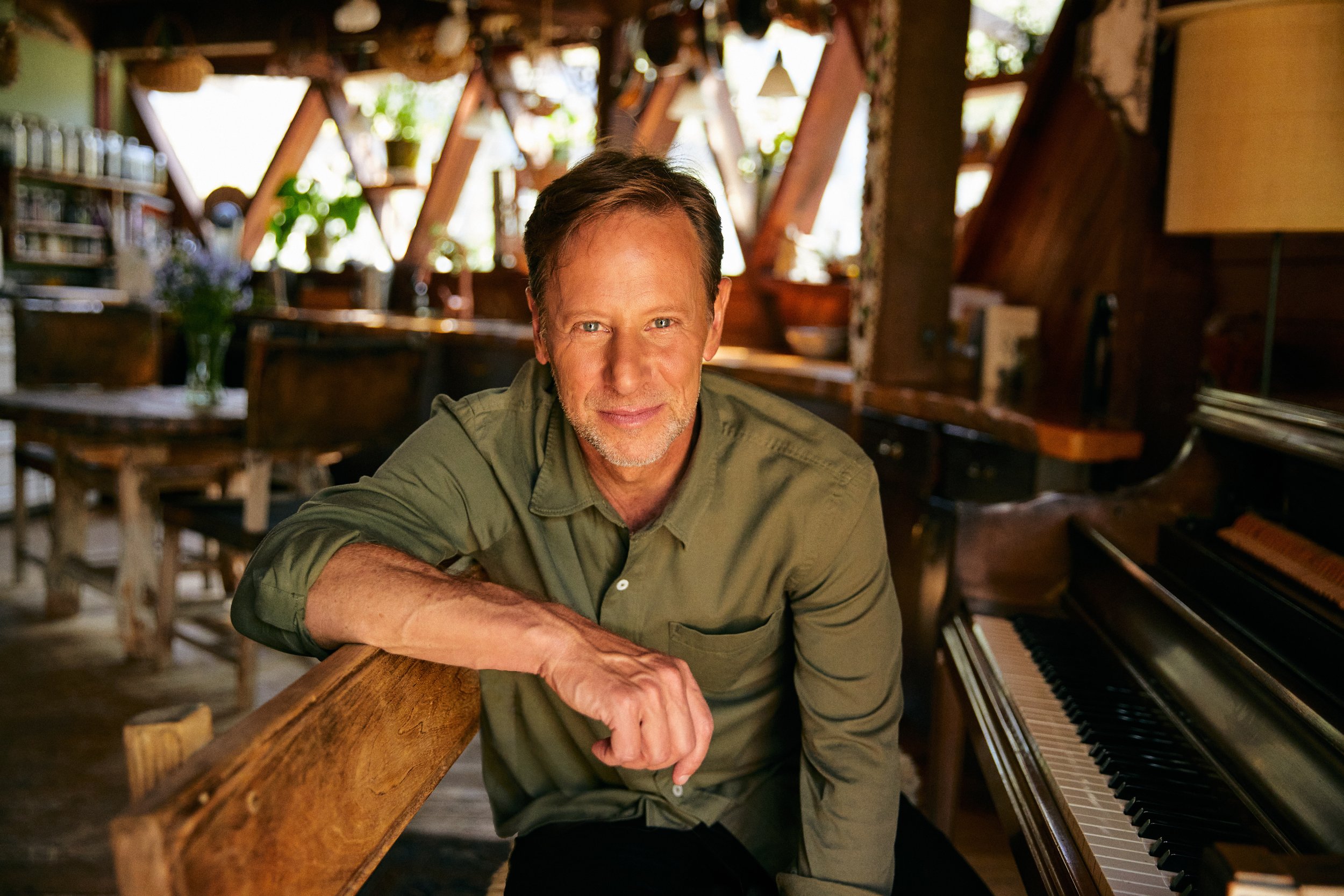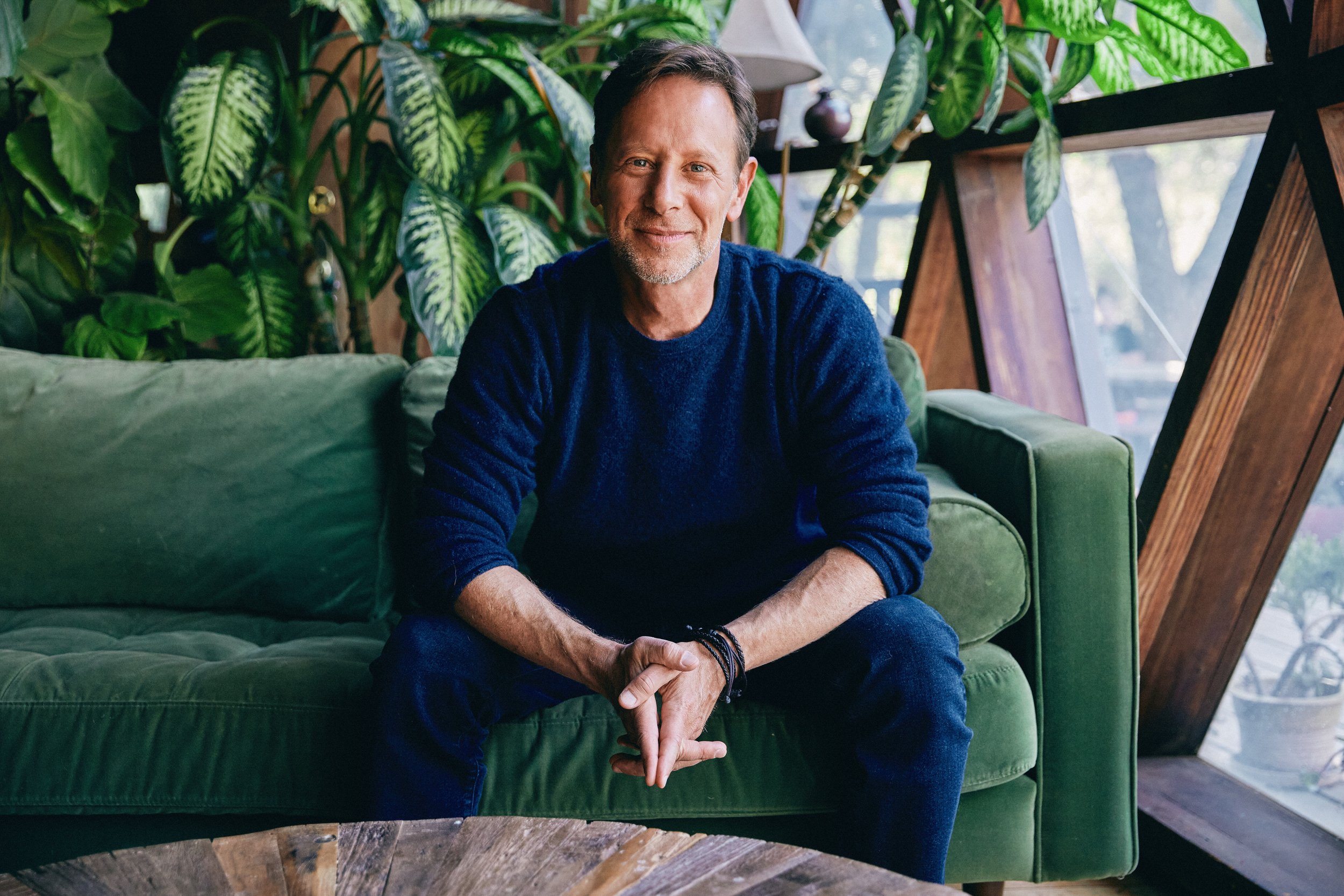Click Image to Download!
Pete Muller is a problem solver. Whether he’s writing songs for his critically acclaimed albums, revolutionizing the way Wall Street works through applied mathematics, or crafting crosswords for the New York Times and Washington Post, the hyper-talented renaissance man always seems to have his eye on unlocking some deeper level of understanding, on reaching some higher plane of enlightenment.
“It’s an essential part of me,” he reflects from his home in Santa Barbara, California. “I’m always trying to drill down to the core of things and figure out how to make them better, how to make myself better. I’m always trying to solve a puzzle.”
With his touching new album, Spaces, Muller takes on perhaps the biggest puzzle of them all: himself. Recorded with Emmy Award-winning producer/arranger Rob Mathes (Bruce Springsteen, Elvis Costello, Elton John, Aretha Franklin, Sting), the collection is lush and timeless, balancing head and heart in equal measure as it wrestles with questions of love and connection and purpose and identity. The writing here is tender and poignant, fueled by profoundly empathetic character studies and remarkably vulnerable acts of self-reflection, and the performances are warm and dynamic to match, mixing singer/songwriter intimacy with classic pop charm and jazz sophistication. Add it all up and you’ve got a rich, moving work of radical honesty, a powerful collection that leaves no stone unturned as it examines the tension between duty and fate, between commitment and escape, between who we are and who we’re meant to be.
“Whenever I’m stuck, whenever something’s not right in my life, I find myself turning to music to figure out what’s really going on,” says Muller. “It’s my way of making sense of it all.”
Raised in New Jersey by hardworking immigrant parents, Muller first began playing piano as a teenager, and while an early gig performing accompaniment for gymnasts nearly took him to the Olympics, music was a passion more than a profession for the first half of his life. At Princeton University, he distinguished himself as a math wiz with a preternatural gift for numbers, and upon graduation, he moved to California, where he became fascinated with the connections between math and finance while working at a consulting firm headed up by a Zen Buddhist. Seven years later, he decided to put his math skills and financial knowledge to use and see if he could beat the markets in New York City, where he built what he humbly describes as a “nerdy quantitative trading business” (profiles everywhere from the New York Times to Forbes paint a slightly fuller portrait of his role as a pioneering figure in the field). Though he soon became more successful than he’d ever imagined, Muller steadily found himself drifting away from music and meaning in his life, and it grew painfully clear that something had to give.
“I was out of balance,” he recalls. “I wasn’t living the way I was meant to be living, so I decided to walk away and find a new path. And the only way I knew how to do that was through songwriting.”
Muller returned to the piano and began composing with the same intensity he’d brought to his work on Wall Street. He busked in the subways, joined a weekly songwriters’ circle (which he would go on to host for five years), and even spent time studying at NYU’s Tisch School as he honed his craft, soaking up everything he could about the creative process from a broad range of artists and performers.
After releasing a pair of early albums, he got married, moved to California, returned to the business he’d founded, and became a father, but the fire in his belly never went out, and in 2014, he returned to the studio to record his third album, Two Truths and a Lie. It was during the recording sessions for that collection that Muller would be introduced to Avatar Studios, which, under its original name of The Power Station, had hosted the likes of Bruce Springsteen, Paul Simon, David Bowie, and Bob Dylan. Like the similarly legendary (and now lost) Hit Factory, the studio was under threat of being sold and redeveloped as condos at the time, and Muller decided to use his resources in partnership with the City of New York and the Berklee College of Music to save, renovate, and re-launch it as a world-class recording and educational facility.
“As a result of my role in that, I ended up meeting Rob Mathes, who’d worked on some incredible albums there over the years,” says Muller, who also founded the non-profit Live Music Society around the same time in order to provide no-strings-attached grants to independent music venues around the country. “Rob basically came to me and said, ‘You have no idea what you’ve done for the music world by saving this place. How can I repay you?’ And I told him, ‘Well, I’m looking for a producer for my next album...’”
The pair found success right out of the gate with 2019’s Dissolve—the album earned praise everywhere from American Songwriter to People Magazine, led to tour dates around the country, and helped Muller land festival appearances from Montreux to Telluride—so it was an obvious choice for the two to team up again on Spaces. Working once more out of the newly renovated and renamed Power Station at BerkleeNYC, Muller captured the core of the record with his touring band, The Kindred Souls, in addition to recording with longtime collaborators like drummer Dave Silliman and bassist Skip Ward before heading to Capitol Studios in LA for horns and strings.
“The whole process was so fun and loose,” says Muller, who penned a handful of the tracks with frequent co-writers/Kindred Souls bandmates John Whooley and Missy Soltero. “And working with Rob is always great because he’s as headstrong and obsessive as I am, so when we decide to go for something, we go all the way.”
That commitment is obvious on Spaces, which opens with the mysterious and inviting “Tin Palace.” Based on a spiritual journey Muller took to reconnect with himself, the song exists somewhere between dream and reality, embracing the flow state that comes from letting go and learning to live in the moment.
“The Tin Palace is a real place,” he explains, “but it’s more a state of mind.”
It’s a tightrope Muller walks frequently on the album, painting vivid lyrical portraits that blur the boundaries between our internal and external worlds. The aching “Gone” insists on growth and acceptance even as it grapples with betrayal and anger, while “The Other Side” tips its cap to the Celtic folk of The Waterboys as it responds to darkness and doubt with defiant optimism, and the intoxicating “Light Up The Night” (a duet with Soltero) searches for answers in the mirror.
“‘Light Up The Night’ is a song about looking for connection,” Muller explains, “but it’s about looking for a connection with yourself rather than with a lover or a partner. It can be easy to forget who you really are sometimes, so it’s important to pause and make sure you’re in touch with your deepest self.”
That push-and-pull informs much of the record: tracks like the soaring “Ready To Go” and soulful “I Still Burn” long for a freedom and fulfillment that feels perpetually out of reach, while tunes like the funky “When She Gives Her Love To Me” and sizzling “Lazy Day” find satisfaction in the simple joys of being present and appreciating what’s right in front of us.
“There’s a story about the Buddha leaving his home and his wife and going into the forest to sit under a Bodhi tree until he reached enlightenment,” says Muller. “When he came home, his wife asked, ‘What did you need to find out there that you couldn’t find here?’ And he said, ‘Nothing. But I needed to go to the forest to learn that.’”
Ultimately, that’s what Spaces is all about. Our greatest quests in life often bring us right back to where we started; our greatest revelations come not from any destinations, but the paths we take along the way. Sometimes the puzzle is the answer.









